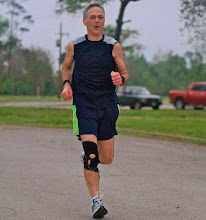Sunday, September 20, 2009
September 20, 2009 - Recovery Run
Recently, I’ve been taking Sunday off after my Saturday long run. However, today I decided to try following the long run with a “recovery run.” I didn’t think about starting this technique until recently; I just started really pushing the long run distance last month. When I first started increasing distance, I followed the long run with a normal medium distance hard run on the next day. That turned out to be a mistake. Then, for several weeks, I took the day following the long run off completely. That worked out better. However, recently I’ve been reading more about the benefits of the recovery run. Here's a link to a good recovery run article.
To summarize, this article discusses the widely-held assumption that recovery runs, relatively short, slow runs within 24 hours after a harder run, clear lactic acid from the legs and facilitate recovery from preceding hard training. In this article the author maintains that lactic acid levels return to normal within an hour after a workout; that recovery runs do not actually enhance recovery. He sees the real benefit of recovery runs coming from working out again in a state of lingering fatigue from the previous training. Long runs boost fitness by taking the body well beyond the point of initial fatigue; recovery runs are performed entirely in a fatigued state, so they boost fitness despite being shorter and/or slower than key workouts.
So, I took a 3.2 miler, very slow and easy, 44:37, had to consciously hold back to keep it really comfortable and stayed under 125 bpm. It felt good- a light workout while still a little achy warmed everything up and seemed to help the aches, without being hard enough to cause any additional fatigue or foot pain.
To summarize, this article discusses the widely-held assumption that recovery runs, relatively short, slow runs within 24 hours after a harder run, clear lactic acid from the legs and facilitate recovery from preceding hard training. In this article the author maintains that lactic acid levels return to normal within an hour after a workout; that recovery runs do not actually enhance recovery. He sees the real benefit of recovery runs coming from working out again in a state of lingering fatigue from the previous training. Long runs boost fitness by taking the body well beyond the point of initial fatigue; recovery runs are performed entirely in a fatigued state, so they boost fitness despite being shorter and/or slower than key workouts.
So, I took a 3.2 miler, very slow and easy, 44:37, had to consciously hold back to keep it really comfortable and stayed under 125 bpm. It felt good- a light workout while still a little achy warmed everything up and seemed to help the aches, without being hard enough to cause any additional fatigue or foot pain.
Labels:
Marathon Training,
Recovery Run
Subscribe to:
Post Comments (Atom)













No comments:
Post a Comment